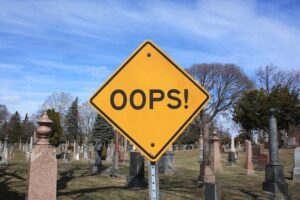You don’t have to be an athlete to make a good mistake. Let’s say you have great technique hitting a tennis ball. You pull the racket back with the right grip, swing and the ball still hits the tape and doesn’t go over. Your coach tells you that’s a good mistake that will help your game. Just like tennis, a good mistake can help you sell.
What is a good mistake?
A good mistake is when you do everything you can control and an external circumstance impacts the result. Let’s say the tennis ball hit the tape because a sudden gust of wind came after you hit the ball. Could you have any impact on the wind? Of course not. It’s important to remember your swing was good, your feet were in the right position and you were in the right place even when the ball hit the tape and didn’t go over. You lost the point. Now what?
With a good mistake you don’t fall apart after getting the result. You focus only on what you can do, not what you can’t. That way you don’t fall apart and give up fighting for the win. The words, “It’s not your fault” come to mind.
What’s a good sales mistake?
Let’s say your questioning strategy uncovered the customer’s need, the key decision makers, who owns the problem, the budget and any other critical information you’ve identified to truly have a viable prospect. You are working through the process of meeting with those key decision makers. You’ve even identified who can say no and you got their support. Yet you don’t get the business.
This happened to a health care professional whose bid was moving forward to a closed deal. At the last minute, a manager in another part of the company who had never provided input for these types of buying decisions, claimed he had the sole decisionmaking authority. This outcome stunned the previously identified key decision makers. What happened? The health care professional lost a promised sale.
This was a good sales mistake. He realized there was nothing he could do to change the result even after meeting with the new department manager. This new department manager was playing internal politics and the health care professional wasn’t going to win. Did that stop the professional from going after other business? No. He realized that a good sales mistake doesn’t have to stop you from working with other viable prospects.
Can you identify when you are making good mistakes?
It’s easy enough to tell yourself that each time you miss a sale that it was out of your control. Of course, that’s not the case in every lost sale. You will learn if you truly experienced a good sales mistake if your general trend is to gain business, not lose business. After all, if you’re getting bad results, something truly is wrong with your strategy. Missed sales, lost business or unhappy customers are all bad results. Be honest with yourself when you experience results you don’t want and attribute the cause of the loss honestly.
Making good sales mistakes is part of sales. Just be sure to make different mistakes and not the same ones again and again.
